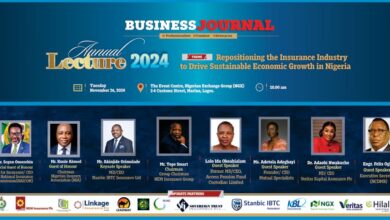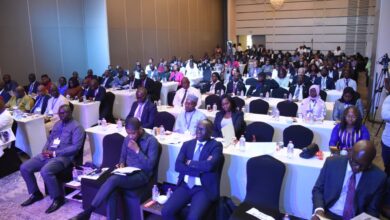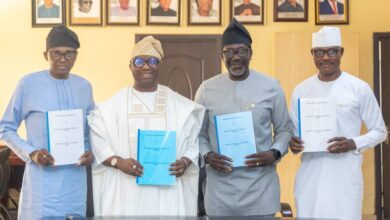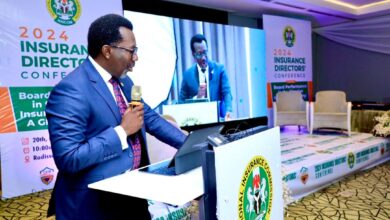Strong policy interventions on state of risk, safety, emergency response and insurance protection important

Past President of RIMSON, Jacob Adeosun
Joseph Obah
The safety and emergency response space in Nigeria has again come under the searchlight, following the spate of Marine and Market Fire disasters occurring across Nigeria in recent times, leading to needless loss of lives and property.
The subject has logically become of prime concern to safety and risk management experts as well as other relevant stakeholders who appear miffed by the disasters which have shown very little prospect of improvement, despite the attention they had supposedly attracted after each incident.
In this interview article, Engr Jacob Adeosun, a consummate Risk Engineer and Industrial Safety Professional, who is easily the Father of Risk Engineering in Nigeria, threw up a number of pertinent but solutions-focused issues with understandably far-reaching impacts towards changing the narrative.
Adeosun’s past and current contributions to the development of National Discourse on Risk Management and Insurance, cannot be overemphasized. He was among the professionals and delegates at the 2024 National Risk Management Conference which was held from 18 to 19 April at Raddisson Blu Hotel in Lagos under the aegis of Risk Managers Society of Nigeria (RIMSON). As a Past President of RIMSON, Adeosun graciously agreed to address a section of the press at the sidelines of the Conference.
The interview with Adeosun centers on the spate of preventable Marine and Market Fire Disasters which raise critical questions about the Challenges of Safety, Emergency Response and Insurance Protection in Nigeria. The most recent Market Fires at Dosumu and Mandillas areas in Lagos, as well as cases of preventable Marine Disasters occasioning the widely reported drowning of Nollywood Actors in Anambra State of Nigeria during a recent boat mishap, present sordid pictures of preventable disasters. These incidents, including Petrol Tanker Fires involving wide spread properties destruction and loss of lives practically in all parts of Nigeria over the years, raise serious concerns about the sincerity of purpose in the country’s Safety Space and also point to the unacceptable state of Safety and Emergency Response infrastructure in our clime. The pathetic crying of Victims for government’s help after each disaster brings up the need for and importance of “Specially Packaged Insurance Solution for Nigeria” going forward.
Adeosun addresses major safety concerns and proffers solutions geared toward stemming the tide of these preventable disasters.
EXCERPTS:
Q: What are the imperatives for the need to deploy Risk Engineering Expertise in tackling Safety and Emergency Response in Nigeria?
A: It is often said that you cannot do something in the same way all the time and expect to get a different result. Another popular saying is that a drastic problem requires drastic solution(s). This means that Complex Technical Challenges can only be conquered by applicable Risk Engineering expertise. Please note that Risk Engineering encompasses all relevant elements of Safety, Loss Prevention, Emergency Response, Design-Installation-Operation & Management of Facilities, Infrastructures & Assets in compliance with all applicable international standards and deployment of All requisite insurance protections – traditional, modern and innovative packages applicable to all Risks and Cases. Above all, sincerity of purpose, undiluted commitment, unquestionable discipline and other related virtues are absolutely required to achieve commendable results in resolving preventable disasters in our public life.
Q: What are the challenges/militating factors against achieving the required results in the Safety and Emergency Response space in Nigeria?
A: Most of the recent Safety and Emergency Response disasters in Nigeria are preventable with substantial reduction of incurred losses and casualties, if applicable Risk Engineering actions are taken, implemented, enforced and sustained. For example, some types of commercial boats including their safety-ignorant and non-compliant Operators, should not be operating in the Nigerian waterways 24years into this millennium. These operators do not comply with any of the most basic Marine requirements.
Ditto for the recurrent devastating market fire disasters in several parts of Nigeria. In most cases, the market structures are without inbuilt fire safety features, the occupancies are overcrowded and stocked with several types of combustible and flammable materials in the absence of fire-fighting appliances and skilled safety personnel. But it seems the authorities allegedly turn blind eyes to these shortcomings until a disaster occurs. Why are we behaving as if there are no safety standards and regulations for occupational and fire safety practices in Nigeria? Since these exist, why are they not being applied everywhere by every one? Again, consequence management appears to be lacking in the public domain. With similar disasters occurring on a regular basis, there ought to be evidence(s) of punishment for negligent safety practices as deterrent. If there is none, nothing will be learnt and worse disaster cases of similar cause will reoccur. And there seems to be no roadmap of action(s) to right these wrongs. I know President Tinubu has his hands full of national challenges to tackle, but he must not allow this to continue.
Q: What are the issues with Preventive Regulatory Interventions in the Nigerian Safety space?
A: Obviously, the practice of Safety, Loss Reduction including Compliance with Applicable Regulations, is only better known in the Oil and Gas Industry and the “high caliber” Manufacturing Sectors in Nigeria. The Public Sector and Agencies which should be the “Drivers of Safety, Loss Prevention and Regulation Practices” have not demonstrated themselves as the Drivers and Champions of this most crucial responsibility in Nigeria. The worst conditions of Safety, Loss Prevention and Regulation are in most occupancies of towns and villages with reckless abandon throughout Nigeria. I don’t know what the performance limitation excuses are BUT I am sure those in authorities are not proud of the disaster records. I believe there are no problems without solutions. The recurrent disasters should not be left to continue. The relevant authorities should demonstrate commitment to addressing safety infractions, going forward.
Let me state also that safety personnel should pursue Emergency Response holistically without leaving any room for gaps. As you might be aware, emergency response comprises: Preparedness, Prevention, Mitigation, Response and Recovery. All of these are important in the value chain and there should be no weak link in the chain. For example, why should any boat passenger not wear “Life Jacket” which is the most basic form of survival requirement in simple water transportation? Emergency response without recovery is incomplete and not cheering. Whenever an accident provides room for emergency response, the pride and joy of the intervention are the lives and assets saved.
Q: What’s the current state of insurance protection against disaster losses in Nigeria?
A: There’s no insurance protection for most disaster losses in Nigeria (market fires, petroleum tanker explosions, boats capsizing etc) that occur frequently in Nigeria. The present state of Nigerian markets, conditions of local boats and some petroleum tankers may be unattractive to existing insurance. But these risks must not be left uninsured as they are now, forever. Each time this disaster occurs, the afflicted weep and beg for government help. Nigerian authorities must innovate insurance solution(s) that will support adequate compensation for the afflicted, and I know that such insurance solutions would incorporate Loss Prevention and Regulations enforcement to sustain the scheme. I therefore recommend that President Tinubu should task RIMSON, CIIN, NIA, RISAN and NAICOM to establish a “Special” Insurance Pool to be initially funded by Government and be self-sustainable perpetually.
Q: Please avail us an overview of international benchmarks for tackling the spate of marine, fire and other preventable disasters in Nigeria.
A: There are international regulations which the Oil Industry in Nigeria complies with reasonably. No need to re-invent the wheel. The applicable ones for commerce, industry and the public exist. The challenge is getting the public to comply with all existing laws and regulations, as they all do whenever they are out of Nigeria. Compliance with the Motor Traffic Regulations is a clear example of irresponsible national indiscipline. Non-willingness of Nigerians to voluntarily comply with the Motor Traffic Regulations on Nigerian Roads is a major challenge and the enforcement system is not effective as you have in Europe and America. While the efforts of FRSC and LASTMA are commendable, a lot, more is required because many Yellow Buses, Trailer Trucks, Tricycles and Commercial Bike Riders (Okadas) appear to be exempted from compliance with Traffic Regulations virtually everywhere in Nigeria. I appreciate the “battle” in Lagos and a few other locations on this challenge, but Nigeria has to win the battle of enthroning Sanity on Nigerian Roads. For me, it is possible fighting the menace from several angles.
Lack of data of all the people in Nigeria, effective data that links each person with his or her whole life, location, movements, assets, health, conduct, performance etc from cradle to grave remains the most critical factor that has promoted indiscipline, criminal acts and impunity in Nigeria. This is a part of non-deployment of applicable technologies to tackle the most critical challenges of indiscipline and insecurity in Nigeria.
In America & Europe, motor insurance premiums are closely tied to compliance with motor regulations, driver’s licence renewals, motor vehicles certificates renewals. So, all owners of vehicles including drivers are voluntarily committed to driving safely in compliance with all motor traffic regulations to avoid the regulatory penalties and increased insurance premiums.
Similarly, loss incidents and claims records are information which affect insurance premiums charged by insurers in Europe and America. These encourage adoption of safety & loss prevention practice to avoid prohibitive increase of insurance premium by every insurer following bad loss record.
I recommend similar stringent enforcement of regulations guiding the occupancies of markets in Nigeria. Ditto for transportation on both inland and coastal water ways in Nigeria. This should stem the spate of marine and market fire disasters.
Q: Please speak to us on the challenges of tackling the seemingly unabating Security infractions in Nigeria (kidnapping/abductions for ransome)
A: I will not prescribe the solutions for the press. The wicked ones use information in the press to adjust their systems of operations. But some dose of risk engineering are required to fast track ongoing efforts. The practice of analyzing government strategies for tackling insecurity on national television and newspapers should be cautiously handled. For success in this venture, reasonable intelligence is required, instead of the approach of doing so in the press.
We thank Engr Adeosun for his time and sincerely look forward to more opportunities with him.
Adeosun is a COREN Registered Engineer and an accomplished member of several professional bodies, including, Chartered Insurance Professional of Insurance Institutes of London and Nigeria, a Risk Management Professional from the Risk Management Institute, London, Fellow, The Nigerian Society of Engineers (FNSE), Fellow, Nigerian Society of Chemical Engineers (FNSChE), Senior Life Member, American Institute of Chemical Engineers (AIChE), and Fellow,Fire Protection Association of Nigeria (FPAN). He is an ISO 900:2000 Quality Management System Lead Auditor, Fellow and Past President, Risk Surveyors Association of Nigeria (RISAN), as well as Fellow and Past President, Risk Managers Society of Nigeria (RIMSON).
Jacob Adeosun has to his credit, over 30 years of Pioneering Risk Engineering services in the Hydrocarbon, Chemical and Other Industries in Nigeria and other countries in Africa with robust contributions at both National and International fora, all of which qualify him as the Leading Light of Risk Engineering in Nigeria.
Joseph Obah,
Editor, Risk Management Digest.





